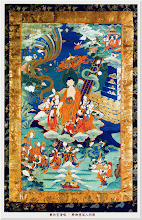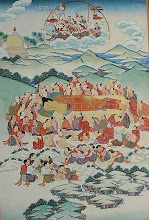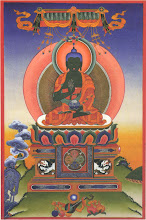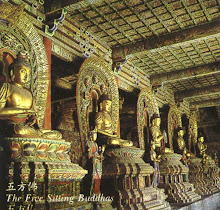Author: Shantideva Bodhisattva
(* Shantideva Bodhisattva is known as a direct disciple of Manjusri Bodhisattva)
The Key of becoming a Bodhisattva:
One who wishes to protect oneself and others quickly, should practice exchanging oneself for others, which is a great mystery.
All those who are unhappy in the world are so as a result of their desire for their own happiness.
All those who are happy in the world are so as a result of their desire for the happiness of others.
Enough of such talk!
Note the difference between the fool who seeks his own benefit, and the sage who works for the benefit of others.
One, who does not exchange his own happiness for the suffering of others, surely does not achieve Buddhahood. How could one find happiness even in the cycle of existence?
Therefore, in order to alleviate my own suffering and to alleviate the suffering of others, I give myself up to others, and I accept others as my own self.
--------------------------------------------------------------------------------
Chapter 1
Chapter 2
Chapter 3
Chapter 4
Chapter 5
Chapter 6
Chapter 7
Chapter 8
Chapter 9
[In copying this ancient manuscript we discovered various translations from different traditions. The reader can be comforted to know that they all agreed with one another in substance, however, some were easier to understand in places then others. In making this text available we worked hard to ensure that it would be comprehensible. In every case we selected the verse that we felt was easiest to understand. BIONA ED.]
--------------------------------------------------------------------------------
Chapter Five
Guarding Introspection
1. Those who wish to protect their practice should zealously guard the mind. The practice cannot be protected without guarding the unsteady mind.
2. Untamed, mad elephants do not inflict as much harm in this world as does the unleashed elephant of the mind in the Avichi Hell and the like.
3. But if the elephant of the mind is completely restrained by the rope of mindfulness, then all perils vanish and complete well-being is obtained.
4. Tigers, lions, elephants, bears, snakes, all enemies, all guardians of hells,
5. Dakinis (evil spirits) and demons become controlled by controlling the mind alone. By subduing the mind alone, they all become subdued.
6. For the Propounder of the Truth (The Buddha) said that all fears and immeasurable sufferings arise from the mind only.
7. Who diligently constructed the weapons in hell? Who devised the floor of heated iron? And from where have those women come?
8. The sage declared that all of that has arisen from the evil mind, so there is nothing else on the three worlds more formidable than the mind.
9. If the perfections of generosity makes the world free from poverty, how is it possible that the Protectors of the past acquired it, when the world is still impoverished today?
10. The perfection of generosity is interpreted simply as a state of mind due to the intention of giving away everything, together with the fruits of that, to all people.
11. Where can fish and the like be taken where I could not kill them? When the mind of renunciation is obtained, that is considered the perfection of ethical discipline.
12. How many malicious people, as unending as space, can I kill? When the mind state of anger is slain, all enemies are slain.
13. Where would there be leather enough to cover the entire world? There earth is covered over merely with the leather of my sanders.
14. Likewise, I am unable to restrain external phenomena, but I shall restrain my own mind, what need is there to restrain anything else?
15. Even when accompanied by body and speech, feeble mental activity does not have results such as Brahma hood and alike, which the mind alone has when clear.
16. The omniscient One stated that all recitations and austerities, even through performed for a long time, are actually useless if the mind is on something else or dull.
17. Those who have not cultivated the mind, which is the mystery and the very essence of Dharma, uselessly wander in space in order to eliminate suffering and find happiness.
18. Therefore, I should well control and well guard my mind. Once I have forsaken the vow of guarding the mind, of what use are many vows to me?
19. Just as those standing in the midst of boisterous people carefully guard their wounds, so those standing in the midst of evil people should always guard their minds.
20. Fearing slight pain from a wound, I guard it with great care. Why don't I, fearing the crushing of the mountains of the Samghata hell, guard the wound of my mind?
21. Living with this attitude even among evil people and among maidens, with steadfast effort, a persevering sage will not be defeated.
22. Let my possessions freely vanish; let my honor, my body, livelihood, and everything else pass away. But may my virtuous mind never be lost.
23. I appeal to those desiring to guard their minds: always diligently guard your mindfulness and introspection.
24. Just as a person smitten by disease is unfit for any work, so the mind lacking those two is not fit for any work.
25. What has been heard, pondered, and cultivated, like water in a cracked jar, does not remain in the memory of the mind that lacks introspection.
26. Even many people who have faith and extraordinary perseverance become defiled by vices on account of the fault of lacking introspection.
27. Even upon accumulating virtues, those who have been robbed by the thief of non-introspection, who come after the loss of mindfulness, enter miserable states of existence.
28. This band of thieves, the mental afflictions, looks for an entrance. Upon finding an entrance, it plunders and destroys life in fortunate realms of existence.
29. Therefore, mindfulness should never be displaced from the gate of the mind. If it is gone, it should be reinstated while recalling the anguish of hell.
30. Mindfulness easily arises for those of good fortune because of their association with a spiritual mentor, and for those who are reverent on account of the instruction of a preceptor and because of their fear.
31. The Buddhas and Bodhisattvas have unobstructed vision in all directions. Everything is in their presence; and I stand in front of them.
32. Meditating thus, one should remain filled with a sense of propriety, respect, and fear; and one should repeatedly think of the Buddhas in this way. 33. When mindfulness stands guard at the gate of the mind, introspection arrives, and once it has come, it does not depart again.
34. First, I should establish this mind in such a manner, and I should always remain still as if without sense faculties like a piece of wood.
35. One should never cast one's gaze around without purpose. One should always direct one's gaze downwards as if in meditation.
36. However, one should occasionally look around in order to relax the gaze; and if someone should appear in the field of ones vision, one should look up and give a greeting.
37. In order to detect danger on the road and so forth, one should look to the four directions for a moment. Pausing, one should look in the distance, looking behind only after turning around.
38. Upon looking forward or behind, one should go ahead or turn back. Likewise, in all situations one should proceed after realizing what needs to be done.
39. Thinking, "The body should remain like this," and resorting to action again, one should periodically look afresh to see how the body is positioned.
40. In this way the mad elephant of the mind should be watched diligently so that it is not loosed while tied to the great pillar of the thought of Dharma.
41. One should examine the mind in this way-where is mine engaged-so that it does not even for a moment leave the pole of concentration.
42. If one is unable to do so in the case of danger or a festive occasion, then one should be at ease. It is said that at the time of giving, ethical discipline may be held in abeyance.
43. Upon recognizing what needs to be undertaken, with a mind focused on that, one should attend to nothing else until one accomplishes it.
44. For in this way everything is well done. Otherwise neither will occur, and the mental affliction of non-introspection will increase as well.
45. One should eliminate yearning that arises for various idle conversations, which often take place, and for all kinds of entertainment.
46. If useless crushing of the earth, ripping of grass, or drawing in the dirt takes place, then fearfully recalling the teaching of the Tath¨¢gata, one should instantly stop it.
47. When one intends to move or when one intends to speak, one should first examine one's own mind and then act appropriately with composure.
48. When one sees one's own mind to be attached or repulsed, then one should neither act nor speak, but remain still like a piece of wood.
49. When my mind is haughty, sarcastic, full of conceit and arrogance, ridiculing, evasive, and deceitful,
50. When it is inclined to boast, or when it is contemptuous of others, abusive, and irritable, then I should remain still like a piece of wood.
51. When my mind seeks material gain, honor, and fame, or when it seeks attendance and service, then I will remain still like a piece of wood.
52. When my mind is averse to the interests of others and seeks my own self interest, or when it wishes to speak out of a desire for an audience, then I will remain still like a piece of wood.
53. When it is impatient, indolent, timid, impudent, garrulous, or biased in my own favor, then I will remain still like a piece of wood.
54. Perceiving in this way that the mind is afflicted or engaged in fruitless activities, the hero should always firmly control it by means of an antidote to that.
55. Resolute, confidant, steadfast, respectful and courteous, modest, meek, calm, devoted to pleasing others,
56. Un-distressed by the mutually incompatible desires of foolish people, endowed with compassion, knowing that they are like this as a consequence of the arising of their mental afflictions,
57. Always resorting to irreproachable things for the sake of myself and others, I will maintain my mind free of pride, like an apparition.
58. Remembering over and over again that after a long time the best of moments of leisure has been attained; I will keep this mind unshakable, like Sumeru.
59. One does not object when the body is dragged here and there by vultures coveting its flesh. Then why do so now?
60. Mind, why do you protect this body, appropriating it as your own? It is really separate from you, what good is it to you?
61. Oh fool, if you do not consider as your own a pure wooden statue, why are you guarding this foul machine composed of impurities?
62. First, with your own intellect, peel off this sheath of skin, and with the knife of wisdom loosen the flesh from the skeleton.
63. Breaking the bones, look inside at the marrow and examine for yourself, "where is the essence here?"
64. If searching carefully in this way, you do not see an essence here, then say why you are still protecting the body today.
65. If you would not eat it, as impure as it is, and if you would not drink the blood not suck out the entrails, then what will you do with the body?
66. However, it is proper to guard it for the sake of feeding the vultures and the jackets. This wretched body of humans is an instrument for action.
67. Even though you protect it so, merciless death will snatch the body away and give it to the vultures. What will you do then?
68. You do not give clothing and such to a servant if you think he will not stay. The body will eat and pass away. Then why do you waste yourself?
69. Therefore, mind, upon giving the body its wages, now serve your own needs, because not everything earned by a laborer should be given to him.
70. Consider the body as a ship because it is the basis of coming and going. Set the body in motion at your will in order to accomplish the welfare of sentient beings.
71. One who has become self-controlled in that way should always have a smiling face. One should give up frowning and grimacing, be the first to greet, and be a friend to the world.
72. One should not inconsiderately and noisily throw around chairs and the like. One should not pound on the door, and one should always delight in silence.
73. The crane, the cat, or the thief, moving silently and covertly, achieves its desired goal. A sage should always move in such a way.
74. One must respectfully accept the advice of those skilled in directing others and providing unsolicited aide. One should always be a pupil of everyone.
75. One should express one's appreciation for all good words. Having seen someone engaging in virtue, one should cheer him on with praises.
76. One should speak of other's good qualities in their absence and relate them again with satisfaction; and when one's own virtue is discussed, one should consider it as appreciation for good qualities.
77. All endeavors are for the sake of satisfaction, which is difficult to obtain, even by means of wealth. So I will enjoy the pleasure of satisfaction in good qualities diligently accomplished by others.
78. There will be no loss for me in this life, and there will be great happiness in the hereafter. But due to animosities, there is the suffering of aversion and great misery in the hereafter.
79. In a soft and gentle voice one should speak sincere, coherent words that have clear meaning and are agreeable, pleasant to the ear, and rooted in compassion.
80. One should always look straight at sentient beings as if drinking them in with the eyes, thinking, "relying on them alone, I shall attain Buddhahood."
81. Great blessing arises from continuous yearning for the fields of virtues and kindness, and from an antidote with regard to those who are suffering.
82. Skillful and vigorous one should always do the work oneself. With respect to all works, one should not leave the opportunity to someone else.
83. The perfections of generosity and so forth are progressively more and more lofty. One should not forsake a better one for the sake of a lesser, unless it is with accordance with the bridge of the Bodhisattva way of life.
84. Realizing this, one should always strive for the benefit of others. Even that which is prohibited has been permitted for the compassionate one who foresees benefit.
85. Sharing with those who have fallen into miserable states of existence, with those who have no protector, and with mendicants, one should eat moderately small proportions. Except for the three robes, one should give away everything.
86. For the sake of an insignificant benefit one should not harm the body that practices the sublime Dharma, for only in this way can one quickly fulfill the hopes of sentient beings.
87. Therefore, when the thought of compassion is impure, one should not sacrifice one's life, but it should be sacrificed when one's thought is unbiased. Thus, life must not be wasted.
88. One should not teach the profound and vast Dharma to the disrespectful, to a healthy person wearing a headdress, to a person with an umbrella, a stick, or a weapon, to one whose head is veiled,
89. To those who are inadequate (whose minds are unprepared), nor to women in the absence of a man. One should pay equal respect to inferior and superior Dharmas.
90. One should not expose a vessel of the vast Dharma to an inferior Dharma. Putting aside the Bodhisattva way of life one should not seduce them with Sutras and Mantras.
91. Flagrantly discarding a tooth-stick or spitting is undesirable and urinating or so forth in water or on land that is useable is contemptible.
92. One should not eat with a full mouth, noisily, or with the mouth wide open. One should not sit with ones legs outstretched, and one should not rub one's hands together.
93. One should not travel, lie, or sit alone with some one else's spouse. After observing and inquiring, one should forsake everything that does not please people.
94. One should not point out anything with one's finger but should respectfully show the way with one's whole right hand.
95. One should not call out to someone and wave one's arms when there is little urgency, instead should snap one's fingers or the like. Otherwise, one could lose composure.
96. One should lie down in the preferred direction in the lion's posture of the lords Nirvana. One should get up quickly with vigilance and a prior determination.
97. The conduct of Bodhisattvas is described as immeasurable. One should first surely engage in practices that purify the mind.
98. Three times by day and three times by night one should recite the Triskandha. By that means one alleviates the remaining downfalls because of ones reliance on the Jinas and the Spirit of Awakening.
99. One should diligently apply oneself to the trainings that pertain to those situations in which one finds oneself, either of one's own accord or under the influences of others.'
100. For there is nothing that the Children of the Jina should not learn. For the good person who behaves in this way, there is nothing that is non-virtuous.
101. One should do nothing other than benefit sentient beings either directly or indirectly; and for the sake of sentient beings alone, one should subordinate everything to Awakening.
102. Never, even at the cost of ones life, should one forsake the spiritual friend who observes the vows of the Bodhisattva and who is well versed in the matters of the Mahayana.
103. One should learn from the Srisambhavavimoksa respectful behavior towards mentors. This and other advice of the Buddha should be known through reciting the sutras.
104. The practices are found in the sutras; therefore one should recite them, and then one should study the primary downfalls in the akasagarbhasutra.
105. One should definitely study the Sikasamuccaya again and again, because good conduct is explained there in detail.
106. Alternatively, one should first look at it briefly, and then carefully read the Sutramuccaya composed by Arya Nargarjuna.
107. Seeing what is forbidden and what is prescribed, one should implement those teachings for the sake of protecting people's minds.
108. In brief, this alone is the definition of introspection: the repeated examination of the state of one's body and mind.
109. I shall practice it with my body. What is the use of merely reading the words? Will a sick person have any benefit merely by reading about medical treatments?
Monday, January 17, 2011
Subscribe to:
Comments (Atom)


























.jpg)














